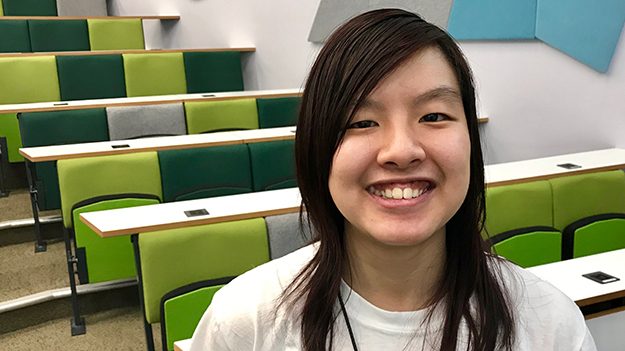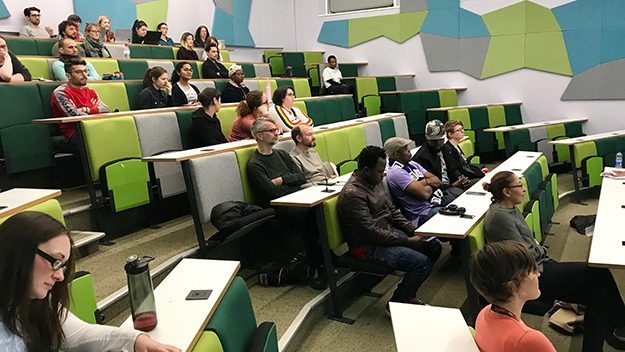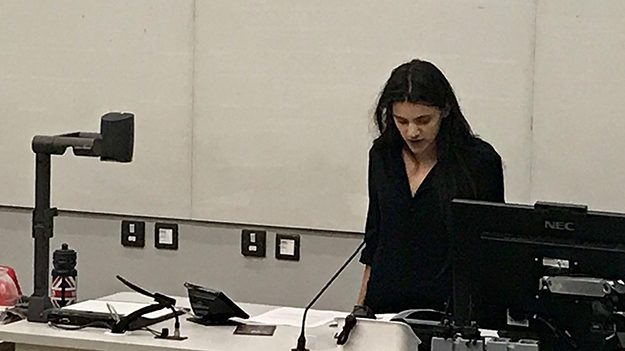As LGBT History Month comes to an end, advocates from around the world share their hopes for a community that embraces all of its members.

Persecution against members of the global LGBTQ community persists. Widespread stigma continues to affect people’s lives in the UK, and around the world, laws prohibit people from coming out, having relationships or seeking gender-confirming healthcare.
Jia Wei Lee is a University of South Wales student from Malaysia who has faced some of the world’s most limiting laws.
“If some of us were to be found out, we could go to jail,” Jia Wei says. “It’s literally everything that my government hates: I’m non-binary, I’m not straight, I’m asexual.”
February is LGBT History Month in the UK. In a community so diverse in race, religion and nationality, History Month has a different personal meaning for everyone.
“LGBT History Month means a lot to me because it’s a reminder that we can be free,” says Jia Wei.
Jia Wei joined other Cardiff activists to remind people not only of the strides the community has made, but of the work still ahead.
A recent event hosted by Glitter Cymru at Cardiff University highlighted the stories of people often left out of LGBTQ movements: immigrants, people of colour and asexual people, to name a few. Glitter Cymru is an organisation offering support and camaraderie to LGBTQ people of colour in Wales.
The fact that some factions of the LGBTQ community continue to feel left out, despite the political gains many have seen in recent years, can seem depressing or even paralysing. But these individuals maintain that if society commits to expanding education and visibility, there are only more gains to come.

“I’ve never actually met another asexual person,” Jia Wei says, “but I’ve heard a lot of stories.”
Jia Wei, who uses they/them pronouns, spoke at Glitter Talks in a segment called “Aceing Through Life.” It outlined their experience as an asexual person navigating a country that criminalises their identity as well as a broader LGBTQ community that often overlooks it. Asexual people naturally lack sexual attraction to others. (To test your own knowledge of asexuality, try the quiz at the end of this article.)
Malaysia is not alone. In many countries, extreme laws against LGBTQ identities persist. Homosexual behaviour is criminal in Pakistan, and India only overturned a similar law in 2018. British colonists originally implemented both.
Many LGBTQ individuals struggle to survive in their home countries, often due to colonial laws, but those of colour also face difficulty from the community itself.
“This group came about after hearing the frustrations of my BAME [black, Asian and minority ethnic] LGBT peers, as well as my own frustrations, of not feeling welcomed, understood or represented by the wider British LGBT community and in society in general,” says Vish, the founder of Glitter Cymru.
Pls RT: Only one week until Glitter Talks: Sex, Sexy & Sexuality! Come along on Weds 27th Feb from 6pm (event starts 6.30pm) to hear BAME LGBT+ voices! Speakers are now detailed on our updated flyer, check it out! https://t.co/LJ5fpwInpZ pic.twitter.com/z5u0oiarWh
— GlitterCymru (@GlitterCymru) February 19, 2019
Statistics bear out this frustration: a recent Stonewall charity study found that over half of LGBTQ people of colour in the UK say they have faced race-based discrimination from within the community.
Just like the imperial laws that led to present-day persecution in many countries, several activists say they feel some members of the LGBTQ community hold colonial mindsets.
“This is really evident in apps,” says Yasmin Begum, a Wales-born bisexual woman of Pakistani descent. “It’s really reminiscent of those signs in old Cardiff: ‘No Blacks, No Dogs, No Irish.’ I think it’s astounding.” She says dating apps are littered with users unwilling to meet people of colour.

Still, the UK is a place of relative safety for thousands of LGBTQ asylum-seekers fleeing violence and persecution. People from around the world, like Jia Wei, say living in a country where their identities are permitted is cause for relief.
“I cried,” Jia Wei says, recalling their first time seeing LGBTQ organisations at a university fair. “It’s really different.”
The past and present blend together as colonialism, racism and anti-LGBTQ sentiment continue to affect people’s lives. Across the board, though, advocates say the community has room to expand if it focusses on education and visibility.
Vish grew up when Section 28 banned the “promotion” of homosexuality and other LGBTQ topics in UK schools–a Thatcher-era law that was in effect until 2003.
Now, Jia Wei and others say they are excited for an upcoming change in Welsh school curriculum that will compel every school to teach students about sex, relationships and mental health in a way that includes LGBTQ identities.
“I welcome these changes and hope there is space within this curriculum to acknowledge that a person’s LGBT+ identity can intersect with multiple marginalised identities such as race and religion,” Vish says. “After all, people are more than one identity.”
Yasmin takes this hope a step further, saying this could be a much-needed example of real “decolonisation” in Welsh society, rather than empty words. “Who really looks after gay, Muslim people under 18 years old, if at all, in this country?” she asks. “I think decolonisation has become a bit of a metaphor.”
Beyond changes to the legal and school systems, Jia Wei says that in order to build a more inclusive future, people should support the organisations that make space for LGBTQ people of colour, immigrants and those with other identities.
“Without people actually supporting us, we can’t expand to be who we really are,” Jia Wei says. “It starts with the people close to you.”
LGBT History Month may be ending, but many of those on the community’s margins hope it marks the beginning of a renewed commitment to include everyone in the fight for liberation. The first steps are clear: listen, make space and offer support.

(function (d) { var js, id = “genially-embed-js”, ref = d.getElementsByTagName(“script”)[0]; if (d.getElementById(id)) { return; } js = d.createElement(“script”); js.id = id; js.async = true; js.src = “https://view.genial.ly/static/embed/embed.js”; ref.parentNode.insertBefore(js, ref); }(document));
